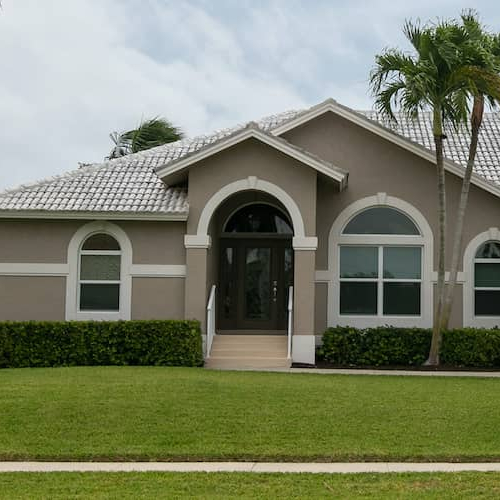What is a physician mortgage loan?
Feb 17, 2025
•6-minute read
A physician mortgage loan, or doctor mortgage loan, is a home financing option aimed at medical professionals. They have features that take into account the unique debt burdens faced by our nation’s healers while typically not requiring a down payment or private mortgage insurance (PMI). While Rocket Mortgage® doesn’t do physician loans, one of our Home Loan Experts can help you find an alternative to meet your goals.
How do physician mortgage loans work?
Physician loans differ from conventional mortgages and other home financing alternatives in several ways. They allow physicians to buy a home while facing a loan process that’s a little easier in terms of credit and debt-to-income ratio (DTI) standards. You might have no required down payment, or it could be up to 10%. It depends on the loan amount.
Shop around to see about the terms, but you can get both fixed- and adjustable-rate mortgages (ARMs). The low rate you get for the first several years of an ARM is temporary, but the lower payment at this time can allow you to put money toward student loan repayments, which can be high after medical school. Alternatively, putting extra toward the mortgage balance could help you maintain a lower payment when the rate adjusts.
What is private mortgage insurance (PMI)?
PMI protects your mortgage lender if you stop making payments on your loan and default. While not benefiting you directly, it does allow you to make lower down payments. You can typically request it come off when you reach 20% equity in your home. PMI cost varies based on a variety of factors including the size of your down payment, your credit score and your DTI. It can be anywhere between 0.1% – 2% of the loan amount annually.
A nice bonus with physician loans is that you don’t have to pay this cost, which could save you thousands of dollars per year, depending on your loan amount.
What is debt-to-income Ratio (DTI)?
DTI is a ratio comparing your minimum monthly debt payments to your monthly income before taxes. It’s expressed as a percentage. To qualify for the most loan options, lenders like to see that your total DTI including your mortgage payment is under 43%, although you can sometimes be approved with higher ratios.
Lenders have an expectation that doctors who have recently graduated medical school can handle a mortgage with their student loan debt because of their higher anticipated incomes, so there can be some flexibility from lenders in terms of DTI approval.
Why physician loans work
Physician loans are specifically targeted at those with a range of doctor credentials. They’re typically aimed at people who will shortly begin working or who are new on the job. These individuals may have a hard time qualifying for other loans based on the DTI they have given their student loan debt from medical school. Physicians are qualified based on current income or even an accepted offer with a start date.
Qualifications for a doctor mortgage loan
Lenders may offer loan programs for medical professionals with the following degrees:
- Doctors of Osteopathic Medicine (D.O.)
- Doctor of Science (D.S.)
- Medical Doctor (M.D.)
- Doctor of Dental Medicine (D.M.D.)
- Doctor of Dental Surgery (D.D.S.)
- Doctor of Podiatric Medicine (D.P.M.)
- Doctor of Veterinary Medicine (D.V.M.)
Lenders may no longer offer these loans once doctors have reached a certain point in their careers on the basis that as you gain experience in the profession, not only will you make more money, but you’ll have had more time to pay off your loans. Moreover, some lenders may offer different programs for registered nurses and physical and occupational therapists.
Property requirements
The one requirement that's pretty much universal with these loans is that it be for you primary residence, a home you're going to live in for the majority of each year. Basically everyone who does these loans offers them on detached single-family residences, but you can also get them for things like condos and planned unit developments if you shop around.
Credit score requirements
While you can be approved with higher debt, lenders are still going to want to know that you demonstrated a good past payment history. Every lender is going to have their own requirements, but you can expect the range to be anywhere between 680 – 720. If your score isn't quite there, steps to build up your credit over time include prioritizing on-time payment and maintaining balances of no more than 30% on credit cards.
Pros and cons of physician loans
There are a number of benefits to physician loans as well as some potential drawbacks.
Pros
- No down payment or mortgage insurance requirement: The minimum requirement for a down payment for other loans is anywhere between 3% – 5% for primary residences. You also won’t have to worry about spending potentially thousands per year on mortgage insurance.
- More flexible DTI qualifications: For lenders, the higher income earned by doctors over the course of their career makes higher levels of debt seem much more sustainable.
- Anticipated employment and income are okay: Lenders will often qualify you with an offer letter that verifies your accepted employment with your start date and income.
- Start looking where you’re practicing: Because offer letters are typically acceptable, you’ll be able to look for a place to put down roots before you start your job so you can hit the ground running.
- Higher loan amounts available: Depending on how much you looking to borrow, you may have to make a down payment, but it’s not uncommon to see loan amounts up to $2 million.
Cons
- Interest rates may be higher: The rate you get on these loans may be slightly higher than what you could get with a traditional mortgage. Not having a down payment requirement or PMI and having acceptance of higher DTI makes these loans more risky for the lender.
- Primary residence only: The house typically has to be your main home where you spend the majority of the year.
- 0% down can be risky for the borrower: If you buy a home and there’s any kind of downturn in the market, you could end up underwater on your mortgage, particularly early in your term. This means you risk owing more on your home than it’s worth.
Alternatives to physician loans
If you choose not to go the physician loan route, there are other home loan options that may work better for you. While not everything will be available as you start your career, these could be a better alternative for some in the long run.
FHA loans
FHA loans are backed by the Federal Housing Administration. These allow you to make a 3.5% down payment with credit scores as low as 580. If your credit score is 620 or better, they allow you to qualify with a higher DTI than many other loan types as well.
The downside of these is that there’s upfront and monthly mortgage insurance if you make a down payment of less than 10%. Loan limits are also set at the county level and you may not be able to get as much home. The floor for FHA loan limits is $524,255 for a one-unit property, while the ceiling is $1,209,750, while these are slightly higher in areas of Alaska, Hawaii, Guam, and the U.S. Virgin Islands.
VA loans
Available through the Department of Veterans Affairs (VA), VA loans allow our nation’s qualifying service members, veterans and eligible surviving spouses to get into a home with 0% down. There’s also no specific credit score requirement. However, lenders may set their own. At Rocket Mortgage, this is 580. At 620 or higher, there’s more DTI flexibility.
One downside of this option is that most people have to pay a funding fee of 1.25% – 3.3% depending on the size of your down payment and whether it’s your first time using a VA loan. This can either be paid at closing or built into the loan amount.
Save for a 20% down payment
Saving for a 20% down payment could offer several advantages. To begin with, even if you get a conventional loan, you wouldn’t have to pay PMI based on a lack of equity in your home. The rate is also likely to be lower because your credit score and your down payment are two of the biggest determinants in your interest rate. Unlike a physician loan, you can also use these for vacation homes and investment properties.
Get a conventional loan with PMI
Depending on income levels in your area and whether you’re a first-time home buyer, you can purchase a primary residence with a conventional loan if you have a down payment of between 3% – 5%. You’ll just have to pay PMI. The good news is that you can request it comes off once you reach 20% equity in your home in many cases. In addition to ARMs, fixed-rate mortgages are common with a conventional loan.
The bottom line: Consider all your options before applying for a doctor mortgage loan
Physician loans offer doctors in many specialties the chance to get into a home with no down payment even if they are carrying lots of medical school debt. They also offer higher loan limits than many traditional mortgages. The downsides are higher interest rates and the potential to be upside down on your home investment if the market turns.
While they don't offer physician loans at this time, Rocket Mortgage can help you find an alternative that works for you. If you're ready, get started with an application.
Kevin Graham
Kevin Graham is a Senior Writer for Rocket. He specializes in mortgage qualification, economics and personal finance topics. Kevin has passed the MLO SAFE exam given to mortgage bankers and takes continuing education courses. As someone with cerebral palsy spastic quadriplegia that requires the use of a wheelchair, he also takes on articles around modifying your home for physical challenges and smart home tech. He has a BA in Journalism from Oakland University.
Related resources

3-minute read
USDA guarantee fees: What are they and how do they work?
USDA loans may not require a down payment, but they do require guarantee fees. Uncover the meaning and role of a USDA guarantee fee in home buying.
Read more

6-minute read
What is an open-end mortgage and should you consider getting one?
An open-end mortgage allows you to borrow the maximum loan amount you're approved for, even if you don't need it all to buy. Learn about open-end loans here....
Read more

8-minute read
What is a nontraditional mortgage?
“Nontraditional mortgage” is a broad term for home loans that aren’t a 30-year fixed mortgage. Here’s how they work and how to qualify f...
Read more